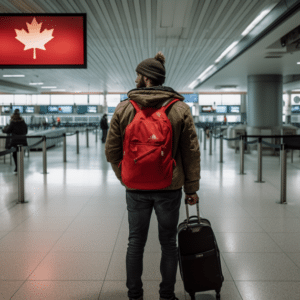If you’re retiring abroad as a Canadian expat, there are a lot of things you must know first, prepare for, and cross-out from your checklist.
Naturally, you would carry a bucket of questions the moment such thought of moving somewhere far from everything you’ve ever known hits your head.
If you want to invest as an expat or high-net-worth individual, which is what I specialize in, you can email me (advice@adamfayed.com) or use WhatsApp (+44-7393-450-837).
Checking Essentials and Emotions
How to Plan Moving Abroad
Planning is essential before retiring abroad as a Canadian expat. When planning for retirement, it’s of course necessary to ensure you have enough money to live comfortably in a foreign country. It’s possible that your lifestyle after relocating abroad won’t be as high as it is now in Canada. Researching and having a solid grasp of what your new cost of living will be will prove crucial.
In addition, it is essential to give careful consideration to the rules and regulations that apply to non-citizens in the potential retirement location. Some examples of this may be time limits placed on stays or ownership stipulations that make it difficult to acquire property. It is necessary to be well educated since unintentionally breaking local laws might result in fines or other legal penalties; thus, it is important to avoid breaking these rules.
The moving procedure is significantly impacted by the logistics involved. In this regard, one of the main things you have to decide is what you want to do with the house you currently own and live in. There is a possibility that some people would decide to keep their Canadian home while others will go ahead and sell it. The sale of the house would need making preparations for the disposal of personal items such as furniture and clothes.
Moving to the location of choice requires the management of several logistical factors, such as the transportation of big objects and the development of a moving budget or financial plan. This plan has to account for one-time expenditures like transporting personal possessions, as well as recurring expenses like keeping a house in Canada up to date with utilities and repairs.
How to Overcome Cultural Shock
Culture shock takes proactive and open-mindedness. Before moving to a new nation, learn about its culture, customs, traditions, and etiquette. This understanding will prepare you for cultural differences. Keep an open mind and expect the unexpected throughout your transition. Avoid making fast judgements or comparisons to your native culture, since this might limit adaptation. Instead, be curious and flexible.
To experience local culture, interact with people, engage in cultural events, and sample new cuisines. Locals and expats may provide support and a feeling of community. Maintaining a healthy lifestyle, choosing things that make you happy, and getting help when required are also crucial. With patience, openness, and time, you can overcome culture shock and enjoy your new environment.
On Citizenship and Healthcare
Can I lose my Canadian citizenship if I live abroad?
Canadian citizens may travel and live anywhere without residence restrictions that would impact their citizenship status. In contrast, Permanent Residents must spend at least 730 days (2 years) in Canada within 5 years to keep their permanent residence status. For job or leisure, Canadian citizens may move overseas without losing their citizenship. However, should you eventually repatriate to Canada, you must carry a valid passport with you.
What happens to my healthcare coverage once I move out of Canada?

It’s only natural to wonder whether your provincial or territorial health plan will still cover you if you’re going to be away from Canada for a considerable period. There are different rules in place for how long you may stay out of the country and yet have your health insurance in effect in each province and territory.
Your health insurance should continue as normal if your trip will last less than six months. However, depending on the restrictions in your province or territory, you may lose coverage if your absence lasts more than half a year.
So, since we’re talking about you retiring abroad, you’ll most likely be away from Canada for a very long time (although we’re not closing any possibilities of you running back any time).
When traveling outside of the country, it is essential to have comprehensive medical insurance. Private travel health insurance is an alternative that might ease your worry in the case of a medical emergency.
Healthcare accessibility at your target location is another factor to think about. Access to public health care may be available in certain nations, but they may be limited.
You should do your homework before going to a new country especially if you have a medical condition that requires specialist treatment. You may need to get a different policy if you require medical treatment outside of Canada covered by your health insurer, so shop around.
Verify that the necessary level of treatment is accessible even if your insurer does cover foreign medical care. Knowing the location of the closest hospital and being acquainted with the local healthcare system is also helpful.
If you want specifics on how long your coverage will last while you’re outside of Canada, it’s best to get in touch with your province or territory of residence. You can count on them to provide you all the information you need about your health insurance when you’re away from home.
On Living, Moving, and Other Costs
As a Canadian considering retiring abroad, you must be aware of the tax and financial implications of doing so. Living overseas may offer many benefits, but it also may come with some costs that could take you by surprise if you don’t plan for it.
For instance, if you decided to keep your home in Canada even as you retire in another country, you should be ready for maintenance costs, taxes, insurance, related bills, and even management cost if you need your property checked from time to time.
On the other hand, retiring abroad as a Canadian expat could offer you some tax advantages plus a cost of living that’s more economical all depending on where you choose to move to.
Many retirees who go overseas choose to rent rather than buy a home. This option is practical and inexpensive in case you have to move again. Utilities and other connected costs must be included into the overall budget for the new house.
Moving abroad may be expensive, particularly for retirees on a limited income. Relocation fees often top the list of these types of outlays. The silver lining is that relocating expenses only occur once. In order to choose wisely, it’s important to get estimates from many different movers and examine the differences between them.
Consider the price of shipping your furniture and other belongings to your new home. This is particularly critical when transporting large items.
Whether they affect you directly or your loved ones back home, unforeseen events are always possible. You may need to make a hasty trip back to Canada if something happens. Make sure you have adequate health insurance and save some money for any emergency flights back home.
Canadian Pensions
What happens to my Canadian pension once I retire outside the country?
Even if you go abroad, Canadian citizens and legal residents may receive Canada Pension Plan or CPP benefits. However, such benefits will not account for the cost of living in your new location. Canadian income tax applies to CPP payouts.
If you have moved outside of Canada but still want to receive CPP benefits, you must notify Service Canada of your new location and present identification. After you’ve finished these procedures, the government will begin directly depositing your CPP payments per month into your bank account.
What about my Old Age Security pension?
If you’ve lived in Canada for at least 20 years, you’ll be eligible to receive your Old Age Security or OAS pension even if you move outside the country. Do remember that this pension payment also won’t get adjusted to account for your new living costs and income tax will be assessed.
To get your benefits, you need to submit a Canadian tax return.
Best Places to Consider in Retiring Abroad as a Canadian Expat
Costa Rica
“Pura Vida” is the Costa Rican way of life, and the phrase literally translates to “pure life.” It exemplifies a comfortable, laid-back attitude and a concentration on delighting in the straightforward joys that life has to offer. Canadians may slow down in nature and relish close community ties.
Portugal
Portugal scores well in safety, healthcare, education, and well-being. There is an elevated standard of life in the nation thanks to the excellent medical care, cutting-edge technology, and convenient public transit.
France
The cultural scene of France is famous worldwide. It offers a slower pace of life in many regions, with opportunities for exploring historic cities, picturesque villages, and beautiful countryside. If you appreciate a rich cultural scene, outdoor activities, and a relaxed lifestyle, France can be a great fit.
Malta
Malta enjoys a Mediterranean climate with mild winters and hot summers. The pleasant weather and ample sunshine make it one of the best places to retire for those seeking a comfortable and enjoyable climate. Maltese living costs vary by geography and lifestyle. It’s possible to save money on housing and utilities while spending more on things like imports and specialty services.

Spain
Culture, history, and the laid-back way of life in Spain are its hallmarks. Activities for retirees vary from visiting museums and monuments to dining on gourmet food and attending cultural celebrations.
The average cost of living varies among the regions of Spain. Smaller communities and rural locations often have lower living costs than major cities like Barcelona and Madrid. Costs for housing, food, and medical care are all often lower than in other European nations.
Thailand
Thailand’s unique culture, warm hospitality, and rich heritage attract many retirees. The country offers a vibrant blend of traditional and modern elements, providing opportunities to explore ancient temples, indulge in delicious Thai cuisine, and engage in various cultural activities and festivals. Thailand is a popular destination for Canadians and other expats seeking to retire or live abroad.
Ireland
Ireland’s lush green hills, rocky shores, and gorgeous countryside have earned the nation a reputation for scenic beauty. There are several hiking paths and other outdoor activities that retirees may participate in. In terms of quality of life, Ireland routinely performs well. Retirement in the country offers a quiet and relaxing environment.
Cambodia
Compared to Western countries, the cost of living in Cambodia is lower. Housing for retirees is cheap, as are common household items and medical care. A rising number of retirees from all around the world have made Cambodia their new home. Retirees searching for companionship among others in a similar life stage might find it in expatriate communities.
Malaysia
Infrastructure in Malaysia is notable, especially in a major city like Kuala Lumpur. This includes modern transportation systems, world-class healthcare facilities, shopping malls, entertainment venues, and other amenities that contribute to a comfortable and convenient lifestyle for a fraction of the cost if you were in Canada.
Bali
Bali is famous for its wellness and holistic living scene. The island offers numerous yoga and meditation centers, spa retreats, and wellness resorts. Retirees can embrace a healthy lifestyle, explore alternative therapies, and indulge in relaxation and self-care activities. They can also enjoy a tropical climate, warm temperatures, vibrant arts, colorful ceremonies, and spiritual practices. There are also established expat communities in Bali.
Vietnam
Fresh ingredients, bold tastes, and a variety of dishes are what make Vietnamese cuisine so renowned across the globe. One of the most wonderful aspects of living in Vietnam is the opportunity it provides retirees to indulge in mouthwatering street cuisine, sample local specialties, and discover the country’s burgeoning culinary scene.
Italy
Italy’s culinary scene is a treat for food enthusiasts. The country’s cuisine is celebrated worldwide for its mouthwatering flavors and fresh ingredients. Retirees can indulge in authentic Italian dishes, regional specialties, and the famous gelato. Italy’s position presents it as a great base for exploring Europe, as retirees may easily visit France, Switzerland, Austria, and Greece.
Belize
Belize offers several retirement programs and incentives to attract retirees. The Qualified Retired Persons (QRP) program, for example, provides various benefits such as exemption from taxes on income generated outside of Belize and import duties on personal belongings. That’s on top of the country offering a tropical paradise offering breathtaking natural beauty, a welcoming community, and a relaxed lifestyle that captures the essence of Caribbean charm.
Croatia
With its solid reputation for public security and political stability, Croatia is an excellent place for retirees to spend their golden years. Enjoy a Mediterranean way of life for cheaper in Croatia, as compared to other European nations.
Pained by financial indecision?

Adam is an internationally recognised author on financial matters with over 830million answer views on Quora, a widely sold book on Amazon, and a contributor on Forbes.



